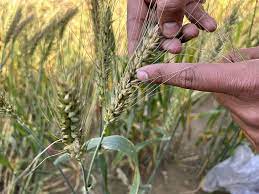NEW DELHI: In more trouble for farmers, flattened wheat crop has started turning black at some places in Punjab. Farmers fear it may be a fungus attack. Agriculture officials are visiting affected fields while farmers have demanded quick release of financial aid for the loss caused by the recent rain and hailstorm.
“First the roots turned black due to waterlogging and now plants have also started turning black. Green fungus is also there as we failed to remove rainwater,” said Megh Singh, a farmer from Mangwal village.
Another farmer, Labh Singh, said after rain and strong winds flattened wheat crop and caused waterlogging, plants had lost grain too.
“The grain has shrunk and there is no possibility of its recovery. Many farmers are hoping against hope, but the fact is we have lost our crop,” he said.
During a visit to various fields at Thalesa, Mangwal and Bhalwan, farmers said the Punjab Government should take quick steps to compensate them. In the Moonak area too, BKU (Ugrahan) leader Rinku Moonak said wheat had turned black in low-lying areas.
“Wheat has turned black in low-lying areas only. We are assessing the crop loss,” said Harbans Singh, Chief Agriculture Officer, Sangrur.
Meanwhile, due to the huge damage to the wheat crop in Punjab and Haryana, the Union Government’s estimate of a record wheat production of 112.8 million tonnes this year was unlikely to be achieved, sources said. They said 16 of the 23 districts in Punjab had reported crop damage.
In the wake of the damage to the wheat crop just before harvesting, the Punjab and Haryana governments have urged the Centre to relax the procurement norms. The Centre has already sent teams to major wheat-producing states, including Punjab and Haryana. “Based on the field reports, we will relax the norms for procurement. Teams are collecting samples from Punjab and Haryana. We will get the reports by Sunday,” said a senior officer.
Sanjeev Chopra, Secretary, Department of Food and Public Distribution, said, “There will be only a marginal loss in the overall production in the country as the damage to the crop in Punjab and Haryana will be compensated by the bumper production in Uttar Pradesh and Bihar. The major impact of the inclement weather will be on the quality, not quantity, of wheat.”


